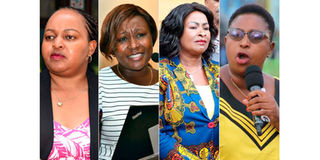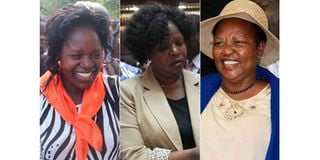Game on! Women candidates in epic poll contest

From left: Homa Bay Woman Representative Gladys Wanga, Nakuru Senator Susan Kihika, Kirinyaga Woman Representative Purity Wangui Ngirici and Isiolo Senator Fatuma Dullo.
What you need to know:
- Homa Bay Woman Rep Gladys Wanga is facing off with former Nairobi Governor Evans Kidero for the Homa Bay gubernatorial seat.
- In Embu, Cecily Mbarire faces a bruising battle with former senator Lenny Kivuti, former Manyatta MP Emilio Kathuri and Dr Njagi Kumantha.
- In Nakuru, it is the making of an epic contest between Governor Lee Kinyanjui (Jubilee Party) and Senator Susan Kihika (UDA).
As the clock ticks towards next month’s General Election, an increasingly encouraging number of women aspirants will be flexing their muscles in the governor, Senate and parliamentary seats with their male opponents, with analysts saying most of the women have real chances.
In the coveted gubernatorial competition, an independent and at least eight party candidates seek to head counties.
At least three women aspirants have thrown their hat in the senatorial ring and more than 20 women contenders are going for parliamentary seats, some of them having won tickets of the parties with strong presence in their regions. Those going for governor seats are Ann Waiguru (Kirinyaga), Gladys Wanga (Homa Bay), Susan Kihika (Nakuru), Cecil Mbarire (Embu), Purity Ngirici (Kirinyaga), Fatuma Achani (Kwale), Aisha Jumwa (Kilifi), and Wavinya Ndeti (Machakos). In Kitui, Governor Charity Ngilu has dropped her re-election bid for a “higher calling”.

From left: Kirinyaga Governor Anne Waiguru, Nominated MP Cecile Mbarire, Machakos County governor candidate Wavinya Ndeti and Malindi MP Aisha Jumwa.
Despite having the support of some of her opponents who had stepped down in her favour, Homa Bay Woman Representative is not yet off the hook despite having the Orange Democratic Movement (ODM) ticket in the race to succeed Governor Cyprian Awiti. She is facing off with former Nairobi Governor Evans Kidero, who opted to run as an independent.
Dr Kidero has vowed to give Ms Wanga and ODM a run for their money, even as the woman representative put up a spirited effort on the campaign trail. Dr Kidero and his supporters believe there was no fairness and that nomination should have been by popular vote.
In Embu, Ms Mbarire, despite winning the United Democratic Alliance (UDA) ticket, faces a bruising battle with former senator Lenny Kivuti of the Devolution Empowerment Party and former Manyatta MP Emilio Kathuri of Jubilee and Dr Njagi Kumantha of the Democratic Party.
In Nakuru, it is the making of an epic contest between Governor Lee Kinyanjui (Jubilee Party) and Senator Kihika (United Democratic Alliance, UDA).
In the 2017 election, Mr Kinyanjui garnered 632,740 votes out of the 949,618 registered voters to win the gubernatorial contest, while Ms Kihika won the Senate seat with 672,343 votes.
Ms Kihika is riding on the UDA wave in her bid to clinch the seat. The former county assembly speaker has constantly criticised Mr Kinyanjui’s administration as she popularises her party’s “bottom-up” economic approach.
“I have a unique insight of the challenges facing the county, having worked with MCAs as their speaker,” she said recently.
In Machakos, Ms Ndeti is battling with three men—UDA chairman Johnson Muthama, Francis Maliti of Maendeleo Chap and former State House Chief of Staff Nzioka Waita of the Chama Cha Uzalendo (CCU) party. Malindi MP Jumwa, after getting Ruto’s party ticket, is out to fight for the governor seat against former Lands Chief Administrative Secretary (CAS) Gideon Mung’aro of ODM and George Kithi of the Pamoja African Alliance (PAA).
Senate
Ms Priscilla Nyokabi (Nyeri), Judith Pareno (Kajiado), Tabitha Karanja Keroche (Nakuru), former Youth and Gender Affairs PS Lilian Omollo Mbogo (Embu) will vie for the Senate.
Currently, Prof Margaret Kamar (Uasin Gishu), Ms Kihika (Nakuru), Ms Fatuma Dullo (Isiolo), and Agnes Kavindu (Machakos) are the only elected women senators. Save for Ms Kihika, all of them are defending their seats.
Just like in the gubernatorial races, women in the senatorial contests face stiff competition from their male counterparts.
Ms Nyokabi, former Commissioner of National Gender and Equality Commission, will be facing Kabando wa Kabando of Narc Kenya with whom she is in the Azimio La Umoja One Kenya coalition, and Wahome Wamatinga of UDA. The same headache is playing out in Nakuru between Ms Karanja and Lawrence Karanja of Jubilee.

From left: Rangwe MP Lilian Gogo, Kabondo Kasipul MP Eve Obara and Turkana Woman Representative Joyce Emanikor.
Women candidates angling for single constituency seats in the National Assembly include Millie Odhiambo (Suba North), Dr Lilian Gogo (Rangwe), Dr Eve Obara (Kabondo Kasipul), Janet Sitienei (Turbo), Charity Kathambi (Njoro), Martha Wangari (Gilgil), Jayne Kihara (Naivasha), Prof Phyllis Bartoo (Moiben), Maryanne Kitany (Aldai) and Alice Wahome (Kandara).
The others are Mary wa Maua (Maragua), Gathoni Wamuchomba (Githunguri), Naisula Lesuuda (Samburu West), Wanjiku Kibe (Gatundu North), Rachel Nyamai (Kitui South), Jessica Mbalu (Kibwezi East), Sarah Korere (Laikipia North), Ruth Mwaniki (Kigumo), Naomi Shaban (Taita Taveta), Rosa Buyu (Kisumu West), Mercy Gakuya (Kasarani) Esther Gathogo (Ruiru) and Mishi Mboko (Likoni).
Some tough parliamentary races for women facing more than one male opponent will be witnessed in Nyanza, Central, and Rift Valley.
Dr Gogo, the current Rangwe MP, is out to break the one-term jinx after securing the ODM ticket. She is vying against three men—former MP George Oner, Dr Erick Komollo and William Omburo Odaje. The three men were disgruntled in the manner in which the incumbent was given direct ticket by ODM, while Dr Gogo is banking on her performance in the past five years.
In case she wins, she will be the first lawmaker to break the one-term jinx which has dominated this constituency for years.
“My electorate knows that I am no pushover; I say what I do and do what I say. In the past five years since I was elected, I have achieved so much for them as per my 2017 manifesto. The major one has been getting 85 per cent of the youth and women to access devolved funds,” she said recently.
Dr Gogo says despite challenges, she wants to change the stigma on women leadership. “I want to change this narration and I am already supporting other women who have leadership qualities and would like to plunge into politics, like me.”
In Moiben, Prof Phyllis Bartoo, a newcomer who won the UDA ticket, is out to battle with incumbent Silas Tiren, an independent.
Mr Tiren, who is the chairperson of the Agriculture Committee in the National Assembly, has the advantage of the incumbency. The area is largely an agricultural constituency, something he will be banking on for re-election.
The electorate will be paying attention to issues of agriculture, having already warned that they will not elect leaders who have kept mum as the maize crisis persisted.
Mr Tiren has been on the frontline of championing better prices of farm produce and reduced cost of farm input. He enjoys cordial relationship with President Uhuru Kenyatta.
In Gatundu North, Ms Kibe, an ardent defender of President Kenyatta, will be facing off against Francis Kigo Njenga of UDA. A similar case will play out in Githunguri, where Kiambu Woman Representative Wamuchomba of UDA will flex muscles against incumbent Gabriel Kago of Jubilee.
Turkana Woman Representative Joyce Emanikor of Jubilee will be battling with UDA contender Joseph Namwar for the Turkana Central parliamentary seat.
Turkana County had only one elected woman in the 2017 General Election besides the woman representative and is one of those that would have benefitted from the two-thirds gender rule as provided for in Article 27 of the Constitution.
However, with the gender principle remaining elusive, more women have joined mixed-gender elective races in face-offs with male aspirants.
“I have been representing my people in the National Assembly through a seat preserved only for women. I am relinquishing it to be part of the solution of getting an increased number of women through battling for constituency seats,” said Ms Emanikor.
Ms Mwaniki of Kigumo and ally of the Head of State will be defending her seat on a Jubilee ticket against Mr Joseph Munyoro of UDA and former Sports CAS Zack Kinuthia of the Party of National Unity (PNU).
Promising numbers
And while all eyes are fixed on August, the 2017 election was an important step forward for women’s representation, and it saw more women win seats at all levels, except for the presidential race, which remains exclusively male.
For the first time, women became governors and senators (three each), and more women were elected to the national and county assemblies (23 members of single member constituencies in 2017 versus 16 in 2013, and 96 members of county assemblies in 2017 versus 82 in 2013).
“While these are positive changes, women constituted just 9.2 per cent of the 1,835 elected individuals in 2017, a marginal increase from 7.7 per cent in 2013,” concluded an analysis of the 2017 polls from a gender lens by the National Democratic Institute (NDI).
Even as the electoral commission gazettes the candidates that will run in the August 2022 polls, the sheer number of women with real chances at the governor, senator, and MP seats is encouraging.





